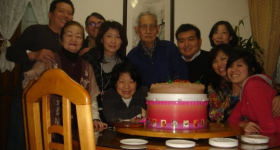Many lovers of Filipino food cheered the recent spate of news articles declaring the cuisine the next big food fad. Long the underdog of Asian fare, the often heavy, deep-fried and meat-centric dishes were finally enjoying their moment in the mainstream. More Filipino restaurants have been cropping up across the country, and they have been innovative and successful to boot. Chicago’s Sunda is a “fancy” (read: not plated on plastic foam trays) Asian restaurant that features many Filipino dishes on its menu. The owners of Purple Yam, a Filipino restaurant in Brooklyn, also wrote a book called Memories of Philippine Kitchens, which documents Filipino food across generations and includes over 100 Filipino recipes.
But the roots of Filipino American food businesses are in catering, which allows entrepreneurs to build up the capital and the reputation to start a restaurant. Catering is a relatively inexpensive way for aspiring Filipino American food entrepreneurs to start a business. Rather than hiring hosts, servers and cooks, many Filipino American caterers rely on their families for cheap, and oftentimes free, labor. “The Park’s Finest doesn’t just include me, but my fiancée and my compadres that I grew up with since elementary school,” said Johneric Concordia, who credits his father for the savory BBQ sauce that has all of my Los Angeles Pinoy friends raving. Concordia owns The Park’s Finest, a popular Filipino BBQ catering service in L.A.
Jay-Ar Pugao, owner of the Oakland, CA-based Filipino vegan catering business No Worries, said his family was the reason the business exists. “My mom innovated it, my brothers promote and handle the behind-the-scenes aspect of it, my father is my investor and believer and my close friends — who I consider family — provide unconditional love and work for it,” Pugao said. “This is definitely a family business.”
Concordia chose to open a catering business in 2009 despite the fact that food trucks were emerging as the fad of the moment for those wishing to start a small food business cheaply. “We knew that taco trucks were going to be poppin’, but we wanted to take a different route,” Concordia said. “Instead of waiting hours in line to get food, give us a call, and at the time designated, we’ll come with the food. Let’s be convenient to the people.”
Pugao started his catering business 14 years ago as a food-loving teen. “Catering was the initial idea because I knew that while in high school, I was not prepared to handle the overwhelming responsibilities of trying to open a restaurant,” he said. Beyond serving up delicious food, these caterers also use their businesses as an avenue to create change in their communities. Concordia attributes his success to his activist background (local nonprofits helped him develop a business plan), and he hopes to give back to the community by someday creating a scholarship fund with the help of The Park’s Finest.
Pugao, on the other hand, hopes to contribute to creating a healthier community. “The reason the name is ‘No Worries’ is to dispel all the negative connotations that Filipino food comes with: unhealthy, oily, fatty, meat-heavy,” he said. Consider the Filipino party staple lechon baboy, a roast pig dish, and it should be little surprise that heart disease is the leading cause of death in the Filipino American community, while diabetes cases are increasing at an alarming rate in the Philippines.
“It is important to me that people understand there is a wonderful alternative for them, but it is up to them to seek it,” Pugao said.
That alternative has become easier to find. In October, No Worries opened its first restaurant, instantly drawing huge lines. The catering business will continue to operate as well. Likewise, Concordia hopes to one day open a “Pinoy House of Blues” in Southern California where the Filipino American community can gather and eat.
So what will it take? Working harder, of course. “Filipino cuisine is the next big thing only if Filipinos represent it as such,” Pugao said.
Concordia agrees. “We’re always competing with one another,” he said. “I think it’s going to be the next big thing if we don’t trip ourselves up. It’s just an issue of supporting each other.”
Paola Rodelas is a writer living in San Diego. She contributes to bakitwhy.com and is an intern for the San Diego Asian Film Festival.









Comments